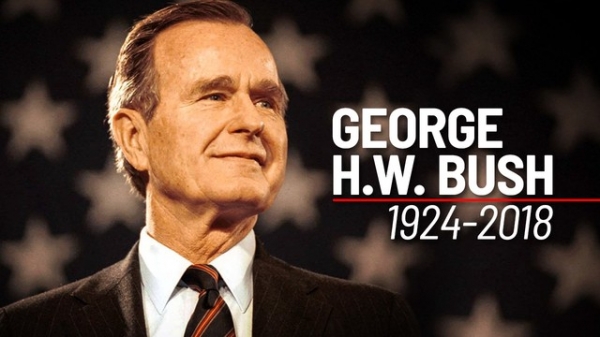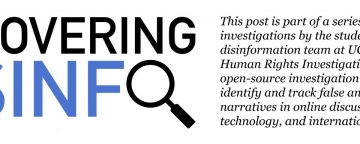Daniel XieBlockedUnblockFollowFollowingDec 7
George HW Bush, father of US president George W. Bush, has died, the press and the sociopolitical elite have mourned his passing, judging him as a hero worthy of commemoration, with many pundits emphasizing the nicer, jovial, human elements of his personality and yearning for the time when he was president — as if he represented some sort of “golden age” before Trump where conservatives were supposedly more reasonable and fair and bipartisian cooperation was possible.
The Real George HW Bush
Yet, the legacy of George HW Bush is anything but a golden age. As president, Bush Sr. presided over many political decisions, many of them having caused more harm than good. Before he became president, Bush was the director of the CIA, and under him the CIA channeled funding to anticommunist guerrillas allied with Apartheid South Africa because of their opposition to the pro-Soviet government of Angola, while exonerating and providing cover for Chilean military dictator Augusto Pinochet for the murder of an American citizen that the CIA did little to protect from Chilean security forces despite having foreknowledge of what Pinochet planned to do, and providing aid to autocratic strongmen such as Congolese president Mobutu and Panama’s Manuel Noriega. As Ronald Reagan’s vice president, Bush was involved in Reagan’s illegal scheme to funnel arms to the far right “Contras” opposing the leftist Sandinista government of Daniel Ortega in Nicaragua, working to cover up his responsibility so it would not ruin his own chances to get into the White House.
As president, Bush sought to impose tough drug laws via his National Drug Control Strategy, which called for more prisons and courts to crack down on perceived drug offenders. In order to put his plans to escalate the “War on Drugs” into action, he had the DEA set up and lure 18-year old Keith Jackson into selling drugs near the white house. Jackson was apprehended and convicted, sentenced to 10 years in prison because the district judge, Stanley Sporkin, was forced to work off of mandatory minimum sentencing laws passed by Congress in 1988 as part of the War on Drugs to sentence Sporkin.
Bush’s picks for the Supreme Court weakened ability for progressive legislation to be passed. He nominated the right wing Clarence Thomas into the supreme court, who was not only a sexual predator, but also ensured the obstruction and defeat of many progressive measures through the decades. Bush also strengthened systemic racism by vetoing the 1990 civil rights act that would have made it easier for victims of racial or sexual discrimination in the workplace to win cases on the basis that it would supposedly introduce destructive “quotas” into employment over any actual merit; a tactic used by the far right today to shut down any calls for greater racial justice.
Bush also did little to provide treatment for those suffering from HIV/AIDS. The lack of support he gave to those suffering from HIV/AIDS led to the ashes action protest where activists took the ashes of loved ones that died from HIV/AIDS and threw it into Bush’s lawn at the white house. In response to the protest, Bush resorted to victim blaming in the presidential debate the day after, claiming that HIV/AIDSvictims simply need to “change their behavior” to stop getting HIV/AIDS; echoing a claim often employed by religious fundamentalists claiming that HIV/AIDS was punishment from God directed against the LGBTQ populace for their rejection of heterosexual norms.
While the media highlights Bush’s foreign policy as a highlight of his presidential career, the reality is anything but. As president, Bush launched the invasion of Panama under trumped-up charges directed against Manual Noreiga despite the US using him as a key ally in the region in late 1989, which led to the destruction of 4,000 residences in Panama and mass civilian deaths.
Like his son a decade later, Bush would in 1990 lead a war into Iraq when Saddam attacked Kuwait, leading to, according to Jeremy Schaill, the deaths of 400 civilians in the Amiriyah shelter. Bush was also responsible for the “highway of death” — the indiscriminate bombardment of Iraqi soldiers fleeing Kuwait city via aerial bombardment. The Gulf War was justified using trumped-up propaganda painting Saddam as another Hitler seeking to build an empire through mass death and conquest. The Bush administration would also seek to create a sanitized image of the war to control any potential dissent, with Dick Cheney, Bush’s secretary of defense and also a key perpetrator of the War on Terror and the Iraq war of 2003 under Bush’s son taking efforts to suppress any major war crimes on the American side in order to present the war in the most sanitized image as possible. Bush also gave false hope to the Shiites and Kurds being oppress by the Iraqi government that if they rise up against Saddam, then the US would support them, only to withdraw any aid and pull out of the war once Kuwait was secured, leading to their brutal suppression by Saddam’s forces.
With the collapse of the Soviet Union, Bush would seek to expand NATO despite the US promising Gorbachev that there would be no expansion of NATO if the Soviets were to lose control of Eastern Europe. While there was indeed no expansion of NATO during Bush’s one term presidency, a memo to NATO from the State Department highlighted that the door is open for taking in more NATO membership in the future even if there was no support in 1990; thus setting the stage for NATO’s gradual expansion into Eastern Europe starting with the accession of the Czech Republic, Hungary and Poland in 1999.
President Bush also started the negotiations that led the ratification of NAFTA in June 10, 1990, when he and Mexican President Carlos Salinas de Gortari issued a statement endorsing a comprehensive free trade pact between the US and Mexico. Eventually, NAFTA would be signed as one of Bush’s last acts in office before being succeeded by Bill Clinton in the presidency, and fully ratified by Clinton in 1993. The job loss resulting from NAFTA and the subsequent creation of America’s “rust belt” would pave the way for the xenophobic populism of Donald Trump, whom positioned himself as an “opponent” to America’s trade deals that supposedly cost the jobs of many Americans.
The Politics of Respectability vs. Accountability:
The whitewashing of a supposedly “respected” politicians after they have died, despite the consequences of their actions, are not new. Despite his own warmongering response towards any nation deemed a threat to US interests, whether Iran or Russia, and willingness to work with far right figures such as Sarah Palin, along with a lack of remorse over his actions in the Vietnam War, John McCain was memorialized as a hero and a voice of civility among the GOP because of his resistance to Trump. This whitewashing of any figure within elite sociopolitical circles extends to Canada, where, despite his catastrophically exploitative mining companies and horrendous abuses directed against indigenous peoples and the Global South through Barrick Gold, as well as his ties to the Fraser institute, which promotes right wing socioeconomic viewpoints and outright bribes people to write essays promoting right wing economic agendas, Peter Munk is remembered as a well meaning philanthropist upon his death with little mention of his crimes.
Part of this whitewashing is due to the fact that those in charge of society, even seemingly democratic societies construct the narratives that function within society, within this framework, those with power would construct narratives that support their sociopolitical worldviews while silencing anything or anyone that they’ve wronged whether in the country they govern or around the world.
Yet, another, equally problematic reason is due to a a sense of respectability politics within society, namely the idea that we can’t speak ill of the dead regardless of their actions, especially if they have established themselves within the sociopolitical framework supposedly “respectfully” as leaders and statesmen. However, a person, can only be judged by the consequences of their actions, not simply whether they smile enough for the cameras or crack enough jokes, and if these actions end up causing harm to a large number of people, then they must be confronted and judged by the outcome of such actions. By not confronting the darker legacies of Bush, or McCain, or Thatcher, or any well established elder politician and statesmen still living such as Kissinger that are held to this regard, and thereby not holding them accountable, we bury their crimes under the dust of respectability and prevent their victims from seeking any form of justice, because those efforts will end up being suppressed by a media and sociopolitical torrent of mournful respectability to our leaders and elder statesmen whey they pass on.
This in turn will only further enable and empower dominant narratives and existing unjust power structures that flourish at the expense of those who suffer beneath them, because there would be no one to bring marginalized narratives to the forefront as everyone would be too preoccupied by haiographic respectability to stand up for those that suffer or are marginalized by those in power.
By not calling out or challenging the legacy of those that did wrong and framing them as respectful leaders and statesmen that are fading remnants of a more respectful and decent time, we also obfuscate our own history. It has been said that those who do not learn from history will repeat it’s mistakes, and by giving our leaders and statesmen respectful whitewashing, we do not put ourselves in a position where we can learn from our mistakes, as we will solely focus on their positives regardless of if they did more harm than good in reality. For instance, with regards to Bush, by painting him as this bipartisian hero, we ignore his own appointment of ultraconservatives to the Supreme Court and his vetoing of the Civil Rights act of 1990s, as well as his framing of himself as tough on crime in his campaign against Michael Dukasis, this being despite the fact that when Trump does something xenophobic or ultraconservative, he is rightfully called out on it. In forcing a more critical look on our political figures based on accountability and justice, we may see how injustices in the past may mirror injustices in the present to a certain degree, or how they may feed into each other with the present influence the past, and this may in turn give us the knowledge to prevent further injustices in the future.
Ultimately, the politics of respectability towards dead statesmen or those in their twilight years obstruct the politics of accountability and justice, as those whom suffered under the policies of leaders and statesmen inflicted upon those they repressed and marginalized are suppressed by narratives honoring the conquerors and suppressing the conquered. In dealing with figures such as George HW Bush(and McCain before him, and Kissinger eventually when he passes if nothing is done to hold him accountable before then), American society can choose to continue to honor these figures and bury the blood they’ve shed under a torrent of haiographic respectability, or they can confront the crimes in front of them, challenge the structures of power established by the continued perpetuation of these crimes, and push for true accountability and change. America may only have either respectability, or it may have justice, not both.



























Connect with us